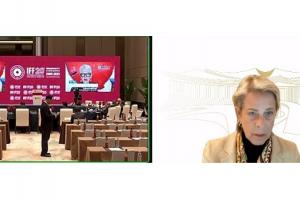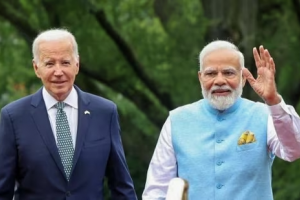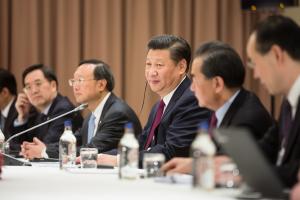Pulse: US
October 29 Comment to International Finance Forum 20th anniversary meeting in Guangzhou
For video delivery, 14:00 CST, Sunday, October 29, 2023; 23:00 PDT, Saturday, October 28, 2023
(Marsha Vande Berg, member of the IFF Academic Committee; Independent Corporate Director and Advisor with expertise in Asia Pacific capital markets. Former Chief Executive Officer, Pacific Pension & Investment Institute)
Technology is the economic security tool driving US-India ties
After PM Modi's US state visit, it is apparent that the partnership between the US-India will rely on tech and innovation to achieve greater economic security.
It may be stating the obvious that technology is central to Prime Minister Modi’s realization of his twin goals for rapid-fire and sustainable economic growth – all the while creating jobs for the world’s largest population.
The Economics of Violence - What's wrong with Chicago?
I live in Chicago so my out-of-town friends assume that I must be well-acquainted with violence. Luckily that is not the case. Despite Chicago’s reputation, our city’s travails are hardly unique in urban America. Our particular crisis in leadership predates Covid, and it does not look like real change is coming anytime soon.
On Friday, Mayor Lori Lightfoot left City Hall for the last time. It was not a fond farewell.
The China Report February 6, 2023 #3 - High Anxiety
This weekend I expected to be writing about the results of Secretary of State Anthony Blinken’s trip to China and prospects for the reopening of China’s post-Covid economy. Instead, Americans have been mesmerized by the week-long journey of a Chinese balloon, and I have been bombarded with questions about what it means. A symbol of both China’s rise and presence in the US, a white balloon galvanized the media in a way that a diplomatic visit would never have equaled.
A Short-Term Reprieve: The Data
A weaker dollar, falling interest rates, lower inflation and oil prices are offering a welcome, albeit temporary relief to emerging markets.
The War of the Words: December 2022 Spotlight
Demonization and its economic consequences, and a peek ahead to the 118th Congress
Disentangling the Crypto Crash of 2022
A reckoning in the digital asset industry that started in June after the collapse of improperly collateralized investment assets gained new urgency in November. Following the professional and possibly legal improprieties that led to bankruptcy and chaos at the FTX cryptocurrency exchange, the industry is regrouping and putting distance between legitimate market participants and the grifters.
C’mon, Democrats, Tout Your Economic Record: It’s a Very Good Story
Drawing on the fact-free politics of Donald Trump, Republicans are selling the meme that Americans are much worse off economically and financially under President Joe Biden and the Democrats. That is demonstrably untrue. Yet, the Democrats’ main response has been to mumble an apology for the inflation they didn’t cause and try and change the subject.
Toward a Strategy for Responding to the PRC in Latin America
The work argues that the problem is not the “lack of a strategy,” but ensuring that the strategies that we apply are appropriate, adequately resourced and coordinated, and the tools we use are up to the task. In addition to concisely stating the nature of the risks to the US and the region arising from some dimensions of PRC engagement, the recommendations advanced by the work include: (1) holding the line for Western corporations, strategic technologies and liberal institutions, (2) helping our partners to strengthen their institutions to get a better deal from their work with the PRC and other actors; (3) fixing, rightsizing and better coordinating our institutional tools for competing, (4) improving our data supported messaging, and (5) advancing clear new strategic concepts for the military as part of a whole of government response, coordinate with our likeminded allies.


 by
by 

 by
by 
 by
by 

 by
by 

 by
by 

 by
by 